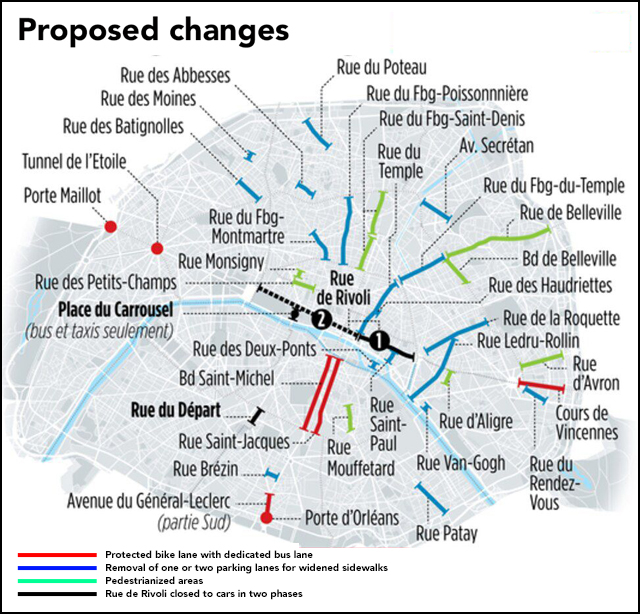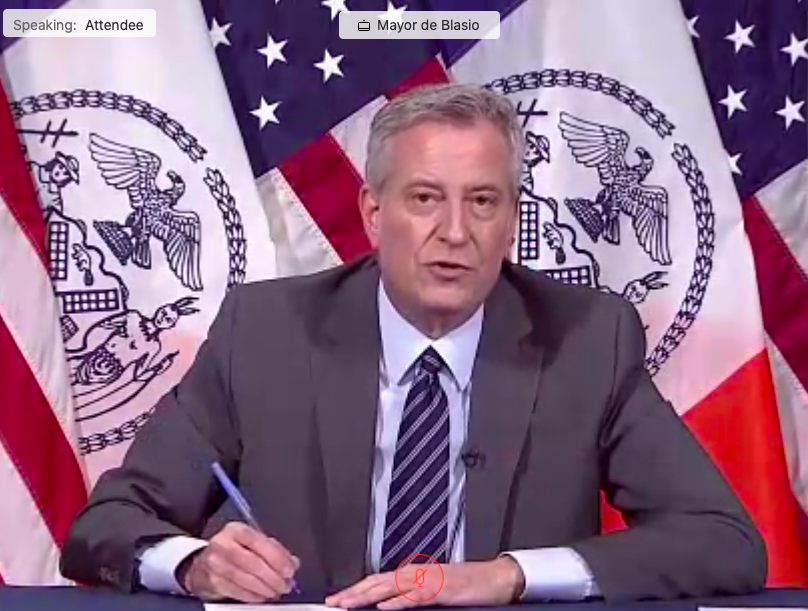Mayor de Blasio refused to commit to making his limited open streets program permanent after the coronavirus crisis — even as he praised his Paris counterpart who is doing just that ... and more.
Asked by Streetsblog on Wednesday if he would make the pledge, the mayor said, "I'm not ready, of course — I think you know the answer in advance."
That answer came as part of a larger question about whether the mayor will adopt policies already being put into place by his friend, Paris Mayor Anne Hidalgo, who, unlike Mayor de Blasio, is not waiting to put into place significant permanent car-reduction strategies in the French capital.
“It is out of the question that we allow ourselves to be invaded by cars, and by pollution,” Hidalgo said last month. “It will make the health crisis worse. Pollution is already in itself a health crisis and a danger — and pollution joined up with coronavirus is a particularly dangerous cocktail. So it’s out of the question to think that arriving in the heart of the city by car is any sort of solution, when it could actually aggravate the situation.”
Mayor de Blasio agrees — but only to a point.
"That's a wonderful quote," he told Streetsblog. "I think the world of Anne Hildalgo. I think she is a fantastic leader. Of all the mayors in the world, she is one of [those] I admire the most." (Vice's Aaron Gordon would certainly agree.)
Imitation is, of course, the sincerest form of flattery, but this mayor isn't ready. Here's why:

The Paris plan (read about it here, if you know French) calls for:
- the construction of large parking lots on the edges of the city, with drivers discouraged via fees (and encouraged via incentives) to leave their cars on the outskirts and continue their trips into the city via bike, foot or transit (Hidalgo has proposed service increases, as well).
- temporary bike lanes along key Metro lines.
- setting aside about four miles of the Rue de Rivoli (basically the Fifth Avenue of Paris) exclusively for bikes.
- reclaiming a total of 31 miles from cars for cyclists.
- pedestrianization of plazas around train stations, with sidewalks widened with the removal of car parking lanes, sometimes on both sides of the street.
Such ideas are taking root not only in Paris, but in London and other world capitals that are similar to New York — except they have leaders that are actively trying to reduce car use. Mayor de Blasio only talks about it — even in the context of Streetsblog's question, which appealed to the mayor's other role — as a parent:
Question: Your 20 miles of proposed 100 miles of open streets are being called a success by residents who like being able to breathe clean air and have their kids play in the street without having to worry about being run over by drivers, which as a parent, you can appreciate is a constant source of anxiety. So will you commit now to making all 100 miles of open streets permanently off limits to cars?
Mayor: I am very sympathetic to the idea that I don't want parents and families looking over their shoulders as you said and feeling nervous and anxious about dangerous vehicles. What we're doing now [open streets during the pandemic] is working for a crisis situation and we will keep expanding during this crisis. I'm not ready, of course, I think you know the answer in advance, to make a commitment about the future, but I want to see what we learn here, for sure. I want to see what Paris is doing. You raised a great question ... about what this recovery needs to look like. And even though you and I joust sometimes, we have very strong common ground on a central issue: I want the recovery to involve people using their cars less in New York City. I'd like to see less car ownership in New York City. I'd like to see more use of mass transit and I think we have to do bold things to get there. That's different from what we are dealing with in the next year or two because we will be in flux for obvious reasons coming out of the pandemic. But I will be lovingly rigorous with you [Editor's note: Wut?] when you ask questions that miss the fact that we are dealing with exigent circumstances that are different from where we are going to go in the future. I'll draw that line. But your question gets to the post-pandemic future, and I sure know I want to see a lot fewer cars in New York City. So we will look at any and all good models here and everywhere else. I want to see a fair recovery and that means more and more mass transit and fewer cars.
It is unclear if the mayor has mandated that his "surface transportation" recovery panel develop car-reduction strategies. The 24-member panel (18 of whom were interviewed last week by Streetsblog) has reported held its first online meeting.






